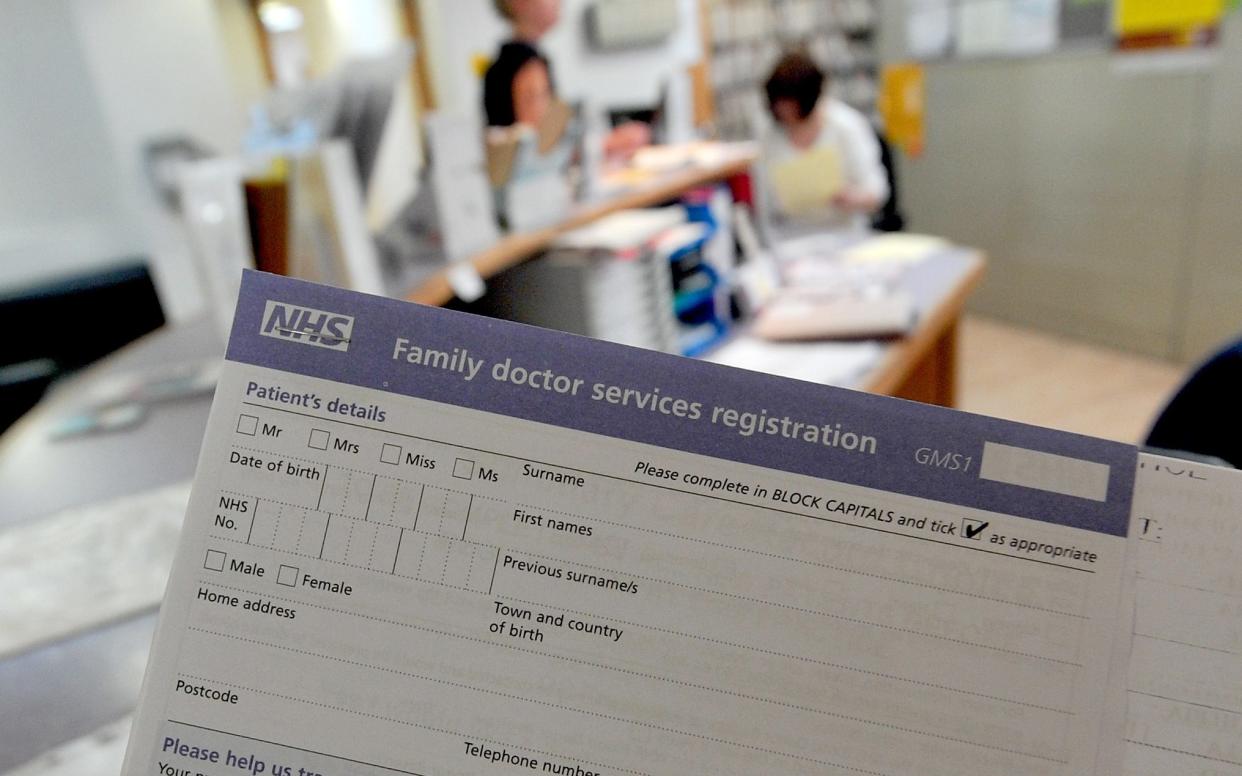Letters: Britain’s struggling GP service has failed to recover from the effects of Covid

SIR – Georgina Stanger (Letters, February 11) says that the King’s cancer diagnosis “throws the parlous state of the NHS into stark relief”, and I can only agree.
Pre-Covid, our village had a doctor’s practice staffed by one doctor, who was supported by several nurses and receptionists. One could ring up in the morning and usually get an appointment with the doctor the same day. Sadly, he retired, so we had to transfer to another surgery further away. This practice lists at least 10 doctors, supported by various healthcare assistants, yet, post-Covid, we find it difficult to get an appointment without a wait of three weeks or more (report, February 16). Why is this?
Jill Smith
Stalbridge, Dorset
SIR – I am glad to say that your headline, “Four-week waits for GP appointments at record high” (report, February 16), does not match up with my experience. Where I live there is no waiting time, and we often get a face-to-face appointment with our chosen GP the same day.
If we call reception on a weekday morning, we are put on a waiting list and receive a reply about 20 minutes later; we then ask for an appointment. If we think a conversation with the GP is sufficient, we receive a call in the evening.
As my wife and I are both very old, we have to see a GP fairly often for various complaints and every time our experience is the same. Perhaps we are just lucky.
Colin Dawson
Canterbury, Kent
SIR – The oncologist Professor Karol Sikora rightly congratulated King Charles for speaking out about his cancer (Comment, February 6) and said that he hoped it would lead others to seek early treatment. However, in his review of the book Why Can’t I See my GP? (January 27), Professor Sikora also stated that: “The key problem for GPs is that the demand for appointments far outstrips their supply.”
As a recent patient of two different surgeries in the Aylesbury area, my experience is that there is no shortage of GPs, just a shortage of GP-days worked. One surgery had 16 doctors on the register, but none worked full time and most worked three days a week. The other surgery had only five doctors but again, most worked a three-day week.
If this situation is typical, surely the excess demand for GPs could be solved by encouraging them away from part-time working. Given the tremendous time and cost expended in training them on behalf of the taxpayer, surely it is not unreasonable to ask them to work more days to pay back this investment.
Perhaps it is time to change GP contracts to reflect this requirement or, like our Armed Forces, introduce minimum fixed-term contracts with buy-out options if an individual wants to leave or work reduced hours.
Graham Kemp
Haddenham, Buckinghamshire
SIR – The possibility of there being a urine test for ovarian cancer (report, February 11) is excellent news. More than 7,000 cases are detected each year across the United Kingdom, but many women are still being diagnosed too late.
We already have a good screen for this cancer by means of a simple blood test for cancer antigen 125 in women over the age of 50. In addition, the results from the UK Collaborative Trial of Ovarian Cancer Screening, which took place between April 2001 and September 2005, and involved more than 200,000 women, are still being published.
We know that annual CA 125 testing improves the detection of early stage ovarian cancers. Bizarrely, however, although the NHS recommends it for women attending their GP with symptoms such as bladder problems and tummy discomfort, there is little encouragement to offer it to asymptomatic women. This means that whether an individual gets screened can depend entirely on their GP.
This is no way to run an early detection service for a life-threatening condition. We need to do better.
Dr Nick Summerton
Welton, East Yorkshire
Pricey potholes
SIR – Purely because of pothole damage, in the past year I have had to replace two tyres and a wheel on my Volvo. I do not understand how Jeremy Hunt, the Chancellor, can even contemplate reducing public spending further (Letters, February 16).
Dr Richard Soper
Great Saxham, Suffolk
Anti-Semitic attacks
SIR – It is disturbing to read that anti-Semitism is persistent and growing (Letters, February 15). The former Chief Rabbi Lord Sacks equated antisemitism to a virus that mutates. Whereas it was religion-based and came from the Church in the Middle Ages, it evolved into a race-based doctrine under the Nazis. The third mutation of anti-Semitism, in contemporary times, is fixated on the Jewish nation-state Israel and Zionism.
Since the outbreak of the war in Gaza and Israel last October, we have seen and heard calls for the eradication of Israel, alongside physical, verbal and online attacks on Jews in Britain. We have also witnessed the virus infect a number of public-facing institutions.
We need the Government and the police to continue to be supportive, and the vast majority of the British public to extend a hand of solidarity to the Jewish community. The message to the zealots and bigots should be clear: anti-Semitism is not just an attack on the Jewish community, but an attack on Britain and the values we stand for.
Zaki Cooper
London NW4
Slavery reparations
SIR – Craig Simpson reports (February 11) that Grenada has called for the Trevelyan slave deal – which saw the family set up a charity to pay reparations to the island nation to atone for their ancestors’ slave profiteering – to be replicated by other slave-owning families and organisations. However, while there is a moral duty to fund reparations to former colonies from wealth gained from the slave trade and plantations, surely there is also a moral duty to pay reparations to British taxpayers, from the vast sums of money given for “loss of (human) property”, which funded great houses and dynasties.
After passing the 1833 Abolition of Slavery Act, the British government was pressured into compensating owners. This cost it £20 million, nearly half the entire national revenue. The government had to negotiate a loan to raise this money, which – according to the Treasury – was finally paid off by British taxpayers in 2015.
We have spent decades paying the owners of stately homes to walk round their properties. Learning that many were funded not only on the profits of slavery, but also by taxpayers’ money to compensate them for giving up that trade, troubles me.
Canon Alan Hughes
Berwick upon Tweed, Northumberland
Hurdles to volunteering
SIR – Denis Fuller (Letters, February 11) refers to the administrative cost of supporting a volunteer. When I was a volunteer, in the youth sector, I was surprised by the level of bureaucracy and administration that I encountered, which resulted in higher than necessary costs to the charity. It almost felt as though there was an assumption of guilt towards anyone volunteering, and that numerous unnecessary procedures had been put in place to put them off.
Obviously there is a need for a robust series of checks before a volunteer is assigned to a sector, but, once that process is completed satisfactorily, perhaps less administration and more trust afforded to volunteers would be beneficial to all. It would certainly reduce the charity’s costs, while maintaining a safe and secure environment.
Paul Vince
Steeple Ashton, Wiltshire
Safer houses
SIR – I am sorry that Richard Rodgers was burgled (Letters, February 11). His experience underscores, yet again, the importance of having a burglar alarm installed, ensuring it covers all entry points and that it is set every night. The same applies when leaving the house unoccupied.
An alarm may not prevent an attempted break-in, but triggering it will cause a would-be intruder to flee. However, CCTV as a crime-prevention measure is a waste of money. This is proven by the countless video clips on television and the internet showing vehicles being stolen from driveways, shops and homes being raided, and people being attacked in the street.
Kevin Duffy
Manchester
First-war fervour
SIR – Reading about the difficulty in obtaining volunteers for the Army at this dangerous time (Letters, February 11) reminded me of my father, who, in 1914 aged 12, tried to enlist – unsuccessfully, I am glad to say.
Such was the patriotic fervour back then that his elder brothers, who did enlist, sadly never returned.
Times have certainly changed, particularly now that so many reside here but feel no allegiance to the country.
Tony Manning
Barton on Sea, Hampshire
Why British wool is no longer the world’s best

SIR – I was dismayed to read the headline: “Farmer sets fire to fleeces after wool prices tumble” (report, February 14).
I was in my local independent carpet shop last week, seeking a British-wool carpet. Sadly, the salesman advised me that pure-wool British carpets were hard to come by, as the wool is mixed with other fibres and the quality of British wool is lower than that of New Zealand’s. British wool is also apparently dirtier than New Zealand’s, which adds to the production costs.
I try to buy British when possible. Whichever government we end up with urgently needs to address the support given to farmers, so that the public can support them.
Suzanne Willson
Banbury, Oxfordshire
Outdated names
SIR – The marvellously monikered John Bunyan says that though has been ordained for 65 years, he has christened only one John (Letters, February 11).
A couple of years ago, realising that I had known or been associated with many Brians in my life, I decided to count them. It came to 28. I then felt that I should list Johns, and, at 69, they comfortably outnumbered the Brians.
Incidentally, my wife of 63 years is called Margaret (Letters, February 11), so that shows how dated we are.
John Weaver
Melton, Suffolk
SIR – I once called out “John” to a colleague I wanted to talk to, and five men turned around and answered.
Lyn Hopkin
Horsford, Norfolk
SIR – I could not help being rather amused by the letters relating to once-popular Christian names. My three lifelong friends are called Janet, Margaret and Joan, which rather gives our age away.
I would like to know where all the young Wendys are – does nobody read Peter Pan anymore?
Wendy Aitken
Bovingdon Green, Buckinghamshire
SIR – Alan Hunt (Letters, February 11) says “young Janets are an extinct species, as are the young Alans”. But at least their forebears are growing old together.
Janet and Alan Solomon
Pinner, Middlesex
SIR – When I was in the sixth form at my (all girls) convent school in the late 1950s, at least 25 per cent of the class were called Margaret.
Even now, if we ever meet any of them, my husband will invariably ask: “Who was that?” To which I always reply: “Oh, just one of the other Margarets.”
Margaret Moore
Ashton in Makerfield, Lancashire
SIR – I know several Janets but not a single Hilda (my own name, which I have always hated). The only time I hear it now is on The Archers, as it is the name of Peggy Archer’s annoying cat.
Hilda Ball
Flackwell Heath, Buckinghamshire
Letters to the Editor
We accept letters by email and post. Please include name, address, work and home telephone numbers.
ADDRESS: 111 Buckingham Palace Road, London, SW1W 0DT
EMAIL: dtletters@telegraph.co.uk
FOLLOW: Telegraph Letters on Twitter @LettersDesk
NEWSLETTER: sign up to receive Letters to the Editor here

